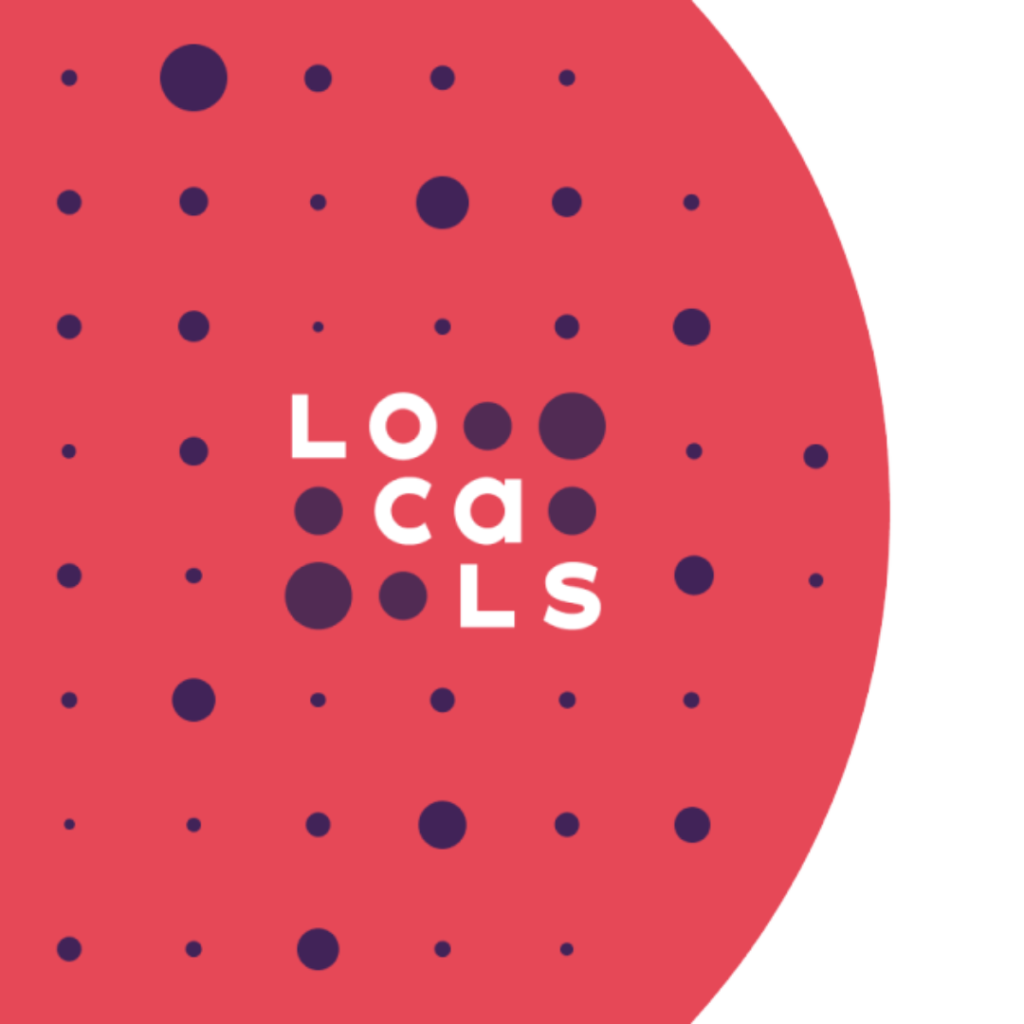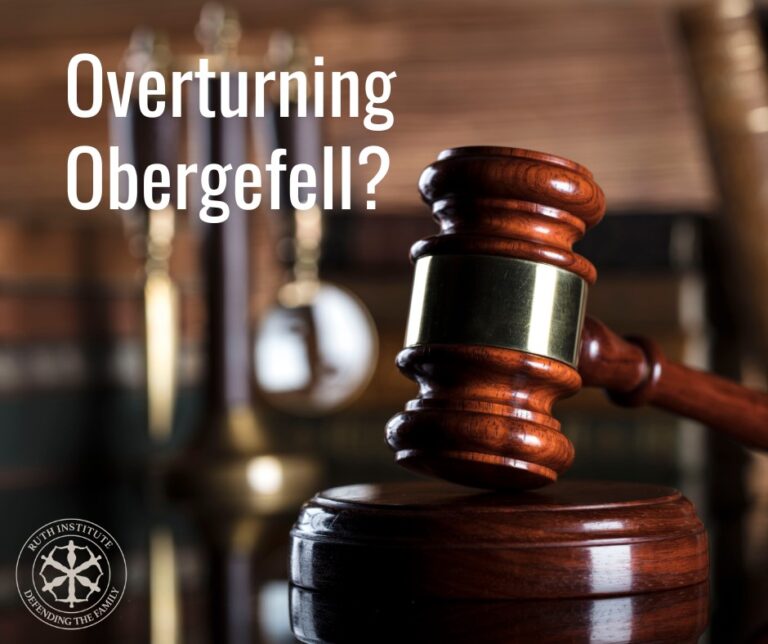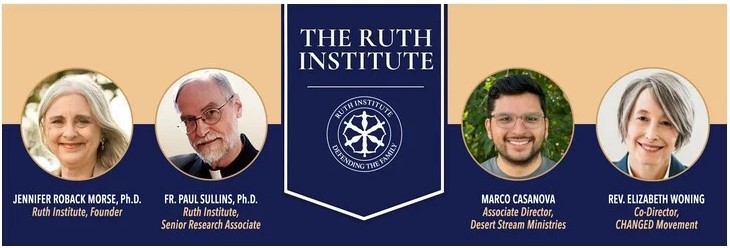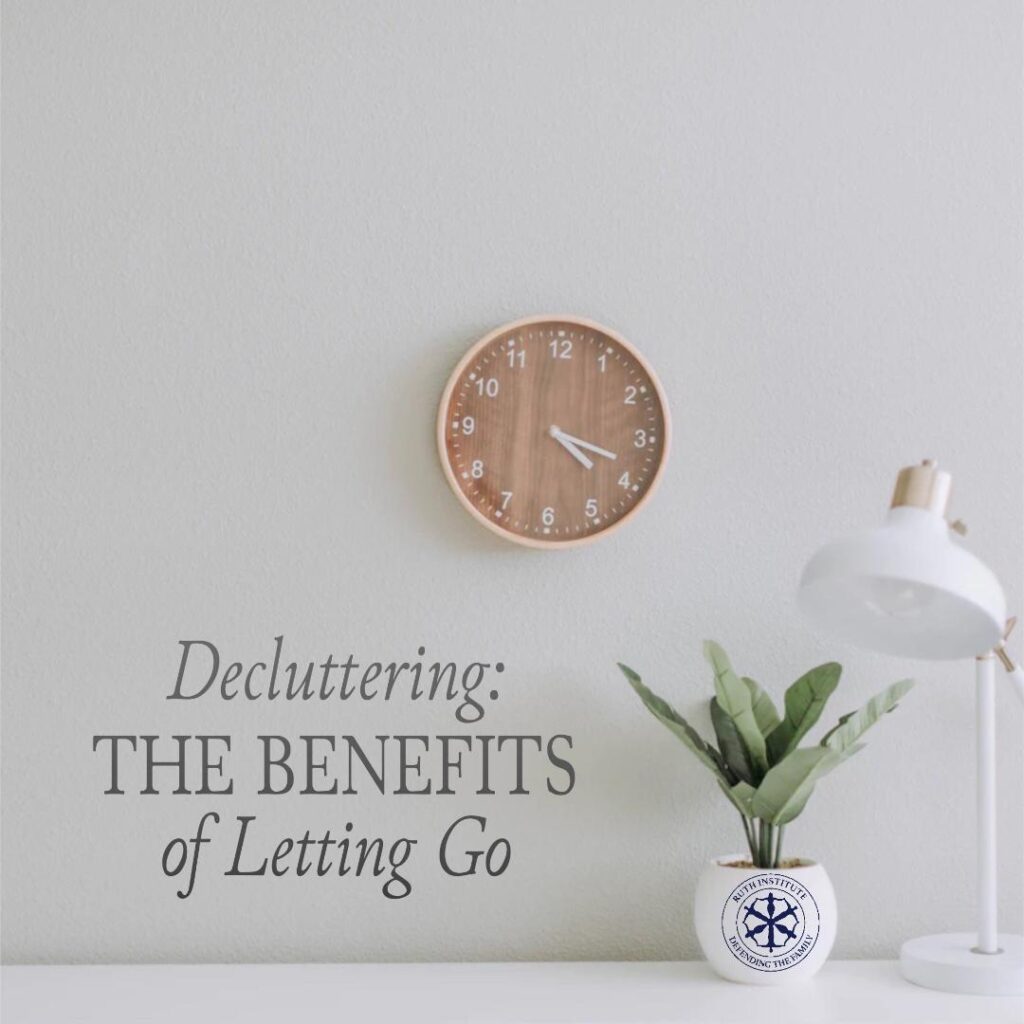
If you are contending with any kind of trauma, you are probably feeling overwhelmed. That’s only natural. However, if the physical space around you is cluttered and disorganized, you will likely feel even more overwhelmed.
Decluttering can be an important part of self-care especially when you are healing from trauma. Choosing to surround yourself with fewer things can improve your sense of well-being and help you to feel more relaxed.
I am not suggesting that everyone has to embrace minimalism. That isn’t for everyone. However, there is something to be said for living more simply and surrounding ourselves with what we truly enjoy and need.
Clutter and stress
Have you ever walked into a room full of stuff? Did it calm you or did it overwhelm you? Maybe you didn’t notice either way. For the next few days, try taking notice of you how feel when you walk into a room especially if it’s in your home. Do your surroundings and things make you feel calm or anxious?
When we have too much stuff and are surrounded by clutter, it can negatively impact our stress levels. Not only does owning more things mean putting extra time and effort into caring for those things, but clutter can make it harder to focus on important tasks. This is especially true if we are already dealing with stress and anxiety due to a traumatic event.
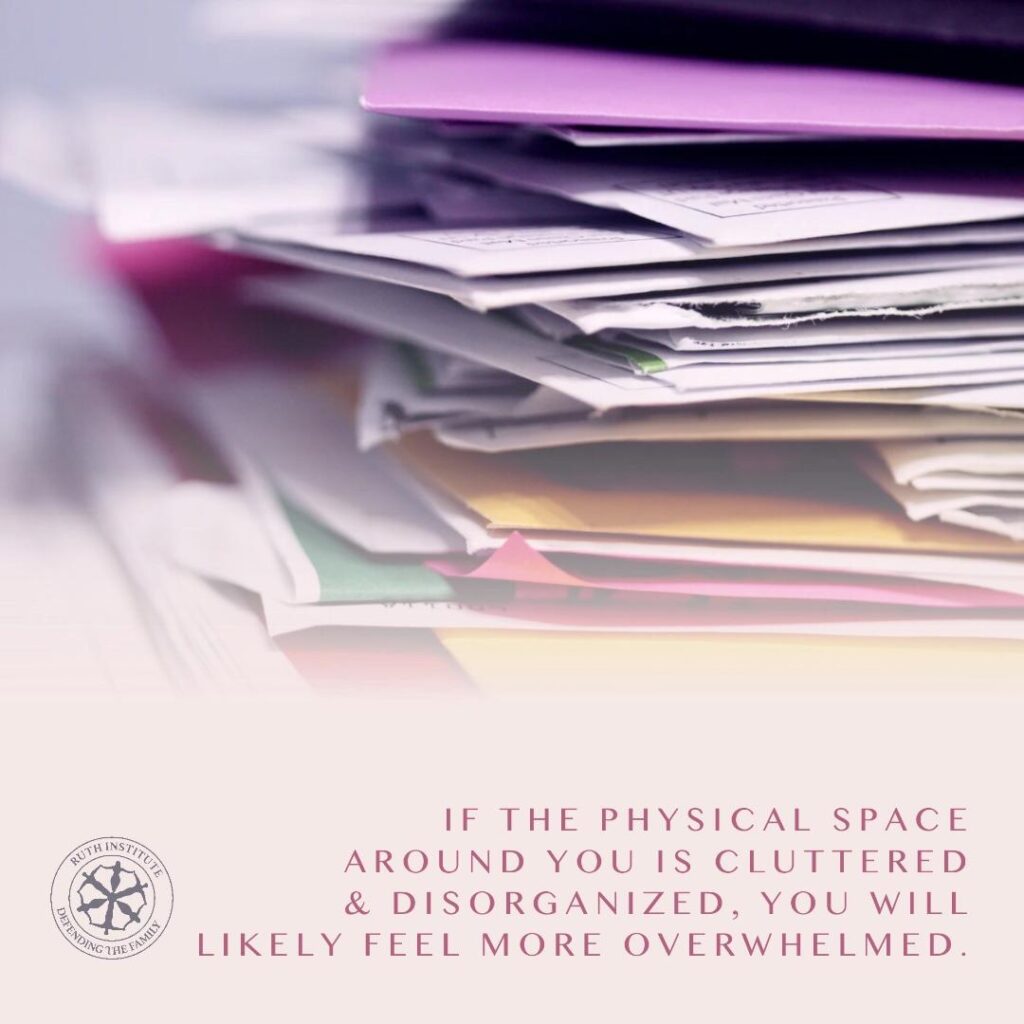
Recognizing why
Recognizing why we are keeping certain things can be very helpful and healing. Is our need to have more of something an attempt to fill a void? Is a part of us trying to prepare for a possible future need? Are we trying to hold onto memories of the past? Are there unexplored emotions or memories we need to face before we fully move forward?
Believe it or not, our physical possessions can hold great power over us. Sometimes we hold onto physical possessions due to the emotional connection they have to certain people, places, and events. That’s not always a bad thing and there’s a lot to be said for sentiment. However, our emotional connections with things can be the result of unresolved issues, a sign of areas that still need healing. When we are living in survivor mode, we sometimes have a tendency to hang onto things “just in case.” We have a need to always be prepared.
Physical clutter can be a result of emotional clutter. For example, several years ago I came across several journals that I had written in as a teenager. I couldn’t seem to find a good place to keep them and kept moving them from one place to another. They were written during very difficult years of my life. These were the years when I had suffered sexual abuse at the hands of a Catholic priest, the death of my brother, the trial of my rapist, bullying from peers, various health issues, and more.
For some reason I could not bring myself to part with my journals. I couldn’t figure out why.
Nothing in those journals was helping me anymore and they didn’t contain anything that I needed to keep revisiting. Yet, I struggled to let them go. I slowly came to realize that I was holding onto the past and was struggling to let go of some unresolved feelings of guilt. Once I recognized why I was holding onto those journals, I was able to address those unresolved issues.
For me, destroying those journals wasn’t just about freeing myself from the physical clutter. It was about freeing myself from the chains of the past. They had been holding me captive more than I realized at the time. Letting go allowed me to close a chapter I hadn’t been fully ready to close until then.
I’m not suggesting that you have to do the same with your own reminders of the past. You have to do what works for you! I just want to encourage you to consider how some of the things you own could be holding you back in your healing.
Benefits of letting go
Some of the benefits of decluttering include:
- Greater mental focus
- Greater sense of control
- More energy
- Less anxiety
- More time to do other activities/projects other than cleaning
- Having less means can lead to more gratitude for the things you do have
- You’ll not only save time, you might also save money since you won’t be buying unnecessary things to bring into your home in the first place.
Some tips for decluttering
Maybe you aren’t bothered by the number of things you own (and that’s fine by the way) but, if you are struggling to keep up with everything, you might find it helpful to go through your belongings every now and then and figure out what you truly like and need.
Here are some tips that I have found helpful for decluttering and organizing my own home:
- Start small. Don’t try to tackle your entire living space at once. Focus on small spaces (such as a drawer) or on small goals (such as going through old mail).
- Set a timer with the goal of decluttering/organizing that small space. Personally, I like to work in 10 minutes increments.
- As you handle each item (especially ones that you are on the fence about keeping), ask yourself what purpose this object is serving. Do you use it, like it, or need it?
- Be mindful of possessions that are tied to traumas you may have suffered. Does this object help to empower you? Does it hold a memory? If so, is that memory a good one or a bad one?
- Declutter first and then organize. Don’t fall into the trap of purchasing large amounts of storage bins and then decluttering. Figure out what you are keeping first and you might discover that you don’t need as many storage solutions as you originally thought.
- It might be helpful to have three piles: trash, donate (or sell), and keep.
Final motivation
As a survivor, I still experience the occasional trigger. I still have difficult moments and bad days. This is normal. However, simplifying my possessions over the years has actually helped to make the difficult times easier to contend with. Letting go of unnecessary things (both physical and emotional attachments) has helped me to let go of the past more.
Decluttering might not be for everyone and that’s ok! However, this week I do want to motivate you to explore the possibility that maybe (just maybe) you need to declutter.
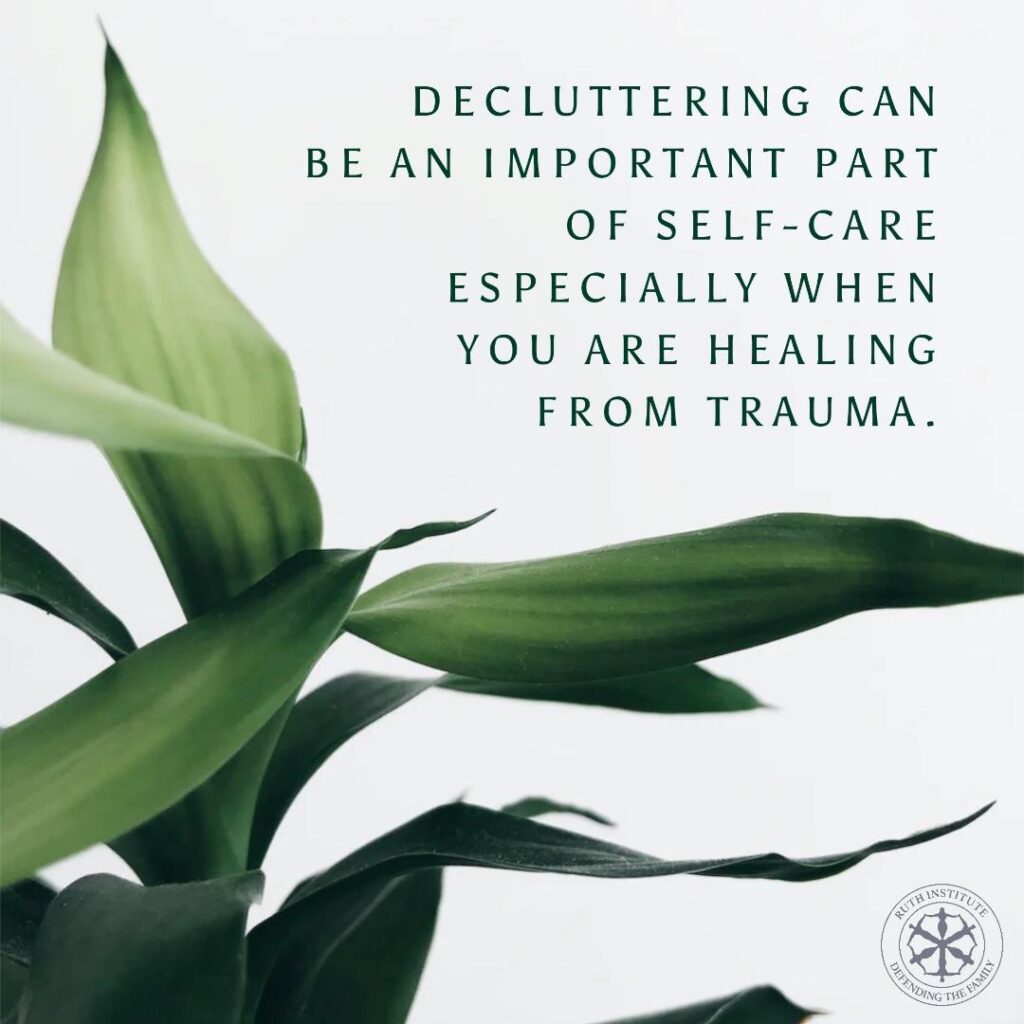
If possessions aren’t an issue for you, maybe you need to consider decluttering your mind from things that are harming you such as letting go of connections that are causing more harm than good, unfollowing social media accounts that aren’t helpful, spending less time on negative thoughts and fears, and focusing more on the positive ones.
The best advice I can give you is to just get started. You have to decide what to do and just do it. Remember to start small!
When it comes to decluttering, it’s important to find what works for you. It shouldn’t fall into an obsession. Rather, it should be used as a tool for better self-care and your overall well-being.
A tidier, more organized space can make a world of a difference in your mindset. It can help you focus better, relieve anxiety, and allow more time for doing things other than constantly cleaning up. Take a few minutes this week to start decluttering and over time you will start to see the benefits of letting go.
About the Ruth Institute
The Ruth Institute is a global non-profit organization, leading an international interfaith coalition to defend the family and build a civilization of love.
Jennifer Roback Morse has a Ph.D. in economics and has taught at Yale and George Mason University. She is the author of The Sexual State and Love and Economics – It Takes a Family to Raise a Village.
To get more information or schedule an interview with Dr. Morse, contact media@ruthinstitute.org.

